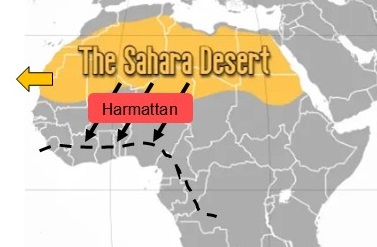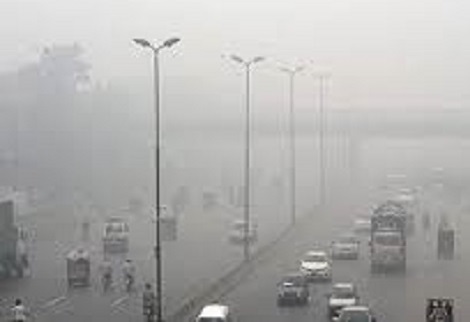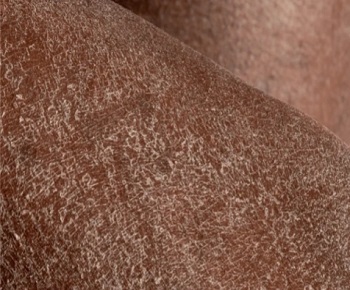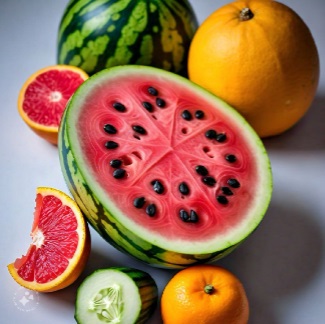By Chiwendu Glory Ogbonna. B.Sc. Biochemistry. Freelance writer and DLHA Volunteer. Medically reviewed by the DLHA Team.

Map showing Region of Africa affected most by the Harmattan
The Harmattan season is a season in which a dusty wind from the Sahara Desert sweeps through West Africa between November and March each year. For many, it signals cooler mornings and hazy skies, but beneath its calm appearance lies a wave of health challenges. From respiratory issues to dry skin and eye irritation, Harmattan affects daily life in many ways. This article dives into the common health problems linked to Harmattan and provides practical tips to stay healthy and comfortable during this season.

Example of reduced road visibility during Harmattan season.
Harmattan is a dry, dusty trade wind that travels from the Sahara Desert across West Africa. It brings a noticeable drop in temperature, reduced visibility due to heavy dust, and extremely low humidity levels. The air often feels cooler, reaching as low as 9 °C (48 °F) all day, but sometimes in the afternoon the temperature can reach as high as 30 °C (86 °F). It carries fine sand and dust particles, which can linger for hours and settle on everything. Countries like Nigeria, Ghana, Senegal, and Mali experience its full impact, making it a significant seasonal event in the region. The dust particles are also carried hundreds of miles across the Atlantic Ocean and its effects may reach as far as the east coast of North America.
The dust-filled air of Harmattan can be a nightmare for people with breathing conditions. The tiny dust particles in the air easily enter the respiratory tract, leading to:
2. Skin Conditions
The Harmattan season’s low humidity, which may drop under 5% saps moisture from the skin, leaving it dry, cracked and vulnerable. Common skin issues include:
Dry, Cracked Skin: Due to dry air during this period the skin is left without enough moisture, leaving it tight, flaky, and painfully cracked.
Eczema Flare-ups: Those with sensitive skin or eczema find their condition worsens during this season.

Dry flaky skin of shoulder region in black person during Harmattan season.
3. Eye Irritation
The fine dust particles during Harmattan can be harsh on the eyes, causing:
Dry Eyes: Due to reduced moisture in the air leaving the eyes feeling scratchy and uncomfortable.
Conjunctivitis (Pink Eye): Dust particles during this period can introduce bacteria or irritants, leading to red, swollen eyes.
4. Dehydration Risks
Low humidity accelerates moisture loss from the body, increasing the risk of dehydration which can lead to headaches, dizziness, and fatigue.

Water-rich fruits (watermelon, oranges, cucumber) that help you hydrate during Harmattan season.
Preventive Tips:
5. Infections
With dust particles in the air, the chances of respiratory infections increases. During Harmattan, exposure to bacteria and viruses are high leading to colds and throat infections.
Public health awareness during Harmattan is crucial. As much as the Harmattan season is a period that West-Africans are used to, Governments and public health managers in the region should run campaigns to educate people on the health risks that arise during this period and the preventive measures that people can take. These campaigns would enable communities to stay informed and take actionable and preventive measures that can significantly reduce their health risks.
Harmattan poses unique non-life threatening challenges. However, with awareness and preparedness, you can protect yourself and your loved ones from its health risks. By staying hydrated, moisturizing your skin, and protecting your eyes and respiratory system during the Harmattan season, you can reduce the health risks and be more comfortable. Remember, a little care goes a long way in staying healthy during Harmattan!
1. Eappen A. How to stay healthy during Harmattan. [Internet, n.d.]. American University of Nigeria. Yola, Nigeria. [Cited 2024 Nov 29]. Available from here.
2. National Health Service (NHS). Respiratory tract infection [Internet]. Last reviewed April 28, 2021. [Cited 2024 Nov 29]. Available from here.
3. Food and Agriculture Organization (FAO). Environmental health impact assessment [Internet, n.d.]. Rome: FAO; [Cited 2024 Nov 29]. Available from here.
4. Continental Hospitals. How seasonal changes impact your immune system and increase infection risk [Internet, n.d.]. Hyderabad, India: Continental Hospitals; [Cited 2024 Nov 29]. Available from here.
5. Rasyando ST. Beware of three coexisting diseases during the dry and transitional seasons [Internet]. 27 September 2023. Human Initiative; Jarkata. [Cited 2024 Nov 29]. Available from here
Published: December 7, 2024
© 2024. Datelinehealth Africa Inc. All rights reserved.
Permission is given to copy, use and share content freely for non-commercial purposes without alteration or modification and subject to source attribution
DATELINEHEALTH AFRICA INC., is a digital publisher for informational and educational purposes and does not offer personal medical care and advice. If you have a medical problem needing routine or emergency attention, call your doctor or local emergency services immediately, or visit the nearest emergency room or the nearest hospital. You should consult your professional healthcare provider before starting any nutrition, diet, exercise, fitness, medical or wellness program mentioned or referenced in the DatelinehealthAfrica website. Click here for more disclaimer notice.